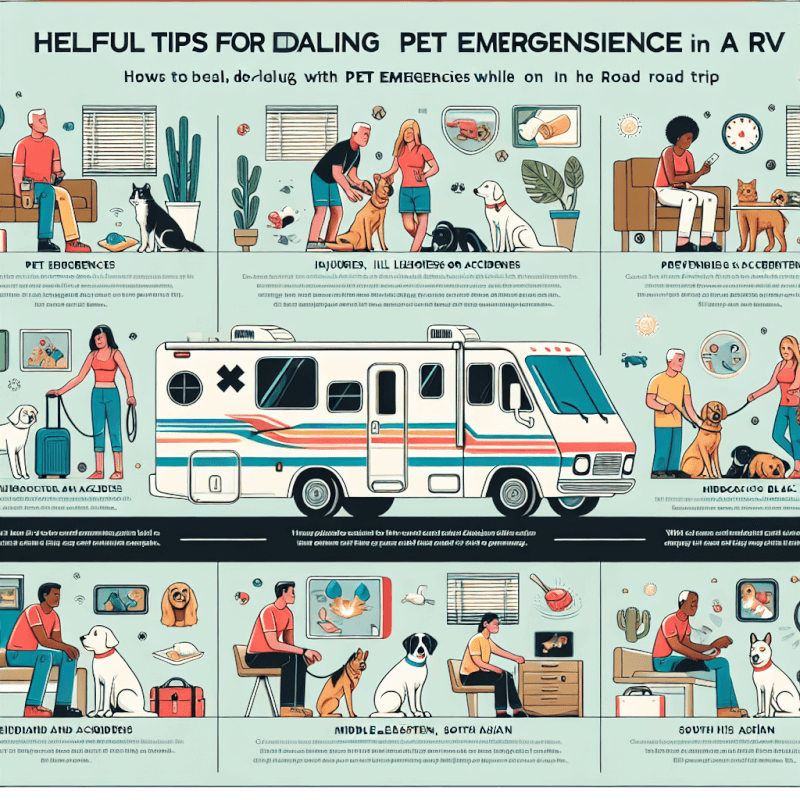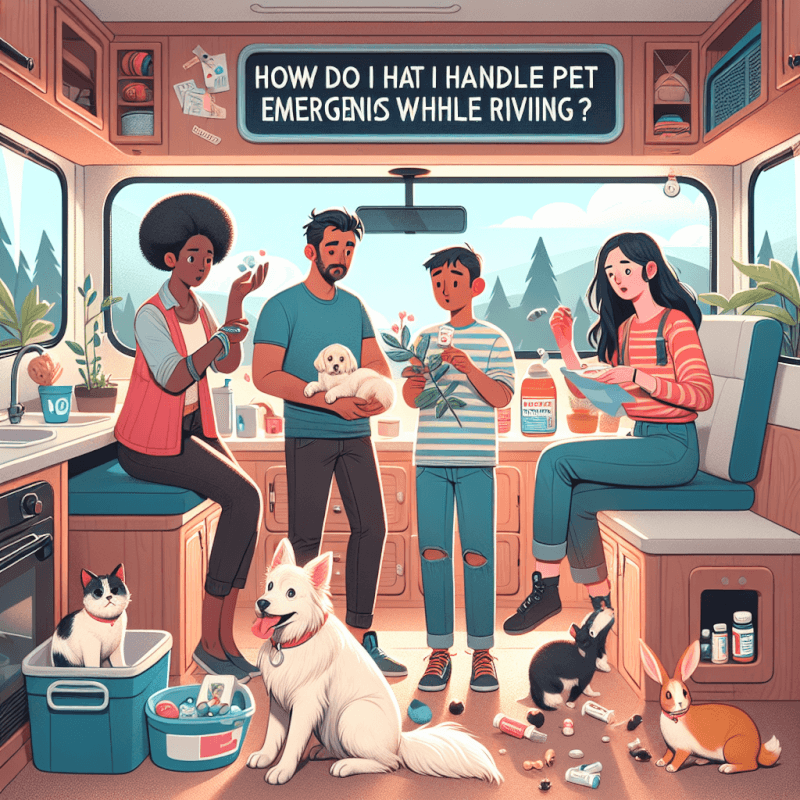Imagine you’re out on the open road, exploring new destinations with your furry friend by your side. But what happens if your beloved pet suddenly falls ill or gets injured? In this article, we’ll provide you with essential tips and advice on how to handle pet emergencies while RVing. From knowing the nearest emergency veterinary clinics to packing a well-stocked pet first aid kit, we’ve got you covered. So, embark on your next adventure worry-free, knowing that you’re prepared to handle any unexpected pet emergencies that may arise along the way.

Preparing for Pet Emergencies
Owning a pet brings immense joy and love into your life, but it also comes with the responsibility of taking care of their well-being. When you are RVing with your furry companion, it’s crucial to be prepared for any potential pet emergencies that may arise. By following a few essential steps, you can ensure that you have the necessary tools and knowledge to handle any situation that comes your way.
Knowing the Potential Risks
One of the first steps in preparing for pet emergencies is to be aware of the potential risks that your pet may face while RVing. Depending on your destination and the activities you engage in, your pet may encounter hazards such as extreme weather conditions, wildlife encounters, or even accidents in unfamiliar surroundings. By understanding these risks, you can take proactive measures to minimize their impact on your pet’s safety and well-being.
Creating an Emergency Kit
Just as you would prepare an emergency kit for yourself, it is essential to have a dedicated emergency kit for your pet. This kit should include items such as bandages, a pet-safe antiseptic solution, gauze pads, a leash, a muzzle (if necessary), a pet first-aid guide, and any medication that your pet may require. Keeping this kit easily accessible in your RV will ensure that you can quickly attend to your pet’s needs in an emergency.
Getting Your Pet’s Medical Records
In the event of a pet emergency, having your pet’s medical records readily available can be incredibly beneficial. Make sure to have copies of your pet’s vaccination records, medical history, and any pre-existing conditions or allergies. This information will help the veterinarian assess and treat your pet more effectively. Keeping these records in both a physical and digital format will ensure that you always have access to them, regardless of your location.
Knowing the Location of the Nearest Veterinary Hospitals
Another crucial aspect of preparing for pet emergencies is knowing the location of the nearest veterinary hospitals along your route or at your destination. Research and make a list of emergency veterinary hospitals that are open 24/7 and have experience with pet emergencies. Having this information readily available will enable you to quickly locate professional help when your pet needs it the most.
Recognizing Pet Emergency Signs
While preventative measures are vital in ensuring your pet’s safety, it’s equally important to be able to identify signs of a pet emergency. By recognizing these signs promptly, you can take immediate action and seek appropriate medical attention for your pet.
Unusual Behavior or Discomfort
Keep a close eye on your pet’s behavior and look out for any sudden changes. If your pet displays signs of restlessness, agitation, excessive panting, or seems to be in pain, it may indicate an underlying health issue. Being observant and attentive to your pet’s behavior will help you identify potential emergencies early on.
Difficulty Breathing or Choking
If your pet is having trouble breathing, it is crucial to address the issue promptly. Wheezing, gasping for air, coughing, or choking can be signs of a respiratory emergency. Check your pet’s mouth and throat for any obstructions, and if you suspect choking, perform the Heimlich maneuver appropriate for your pet’s size or seek immediate veterinary attention.
Excessive Bleeding
In the event of an injury resulting in excessive bleeding, it’s vital to take immediate action. Apply direct pressure to the wound using a clean cloth or bandage, and elevate the affected area if possible. This will help minimize blood loss and buy you some time to reach a veterinarian.
Vomiting or Diarrhea
While occasional vomiting or diarrhea may not necessarily be a cause for alarm, persistent or severe cases can indicate an underlying issue. Keep an eye on the frequency, consistency, and color of your pet’s vomit or stool. If the symptoms persist or are accompanied by other signs of distress, it’s advisable to consult a veterinarian.
Seizures or Loss of Consciousness
Seizures and loss of consciousness are severe emergencies that require immediate attention. During a seizure, ensure that your pet is in a safe, padded area and clear any sharp objects or hazards nearby. Time the duration of the seizure and provide this information to the veterinarian when seeking medical help.

Immediate Actions
In the face of a pet emergency, it’s natural to feel overwhelmed. However, remaining calm is of utmost importance as it allows you to think clearly and take the necessary actions to help your pet.
Remaining Calm
Your pet can sense your emotions, and being calm will help reassure and comfort them in a distressing situation. Take deep breaths, speak in a soothing tone, and focus on the steps you need to take to provide the best care for your furry friend.
Examining Your Pet
Before contacting a veterinarian, conduct a thorough examination of your pet’s condition. Check for any visible injuries, signs of distress, or abnormal behavior. This information will be valuable when discussing your pet’s symptoms with the vet.
Contacting a Veterinarian
Once you have assessed your pet’s condition, it’s time to reach out to a veterinarian. Describe the situation in detail, conveying the specific symptoms and behavior your pet is exhibiting. The veterinarian can provide guidance on whether immediate emergency care is necessary or if certain actions can be taken at home.
Administering CPR or First Aid (if necessary)
In some emergencies, providing immediate CPR or first aid to your pet can be life-saving. It is essential to learn these techniques beforehand so that you can perform them correctly during a crisis. However, always consult a veterinarian to ensure you are following the appropriate protocols for your pet’s specific situation.
Transporting Your Pet Safely
When your pet needs immediate medical attention, it’s crucial to transport them safely to the nearest veterinary hospital. Taking the right precautions will minimize stress and further injury during the journey.
Preparing a Pet Carrier
Having a suitable pet carrier is essential for safe transportation. Make sure it is secure, well-ventilated, and has enough space for your pet to stand, turn around, and lie down comfortably. Familiarize your pet with the carrier before an emergency occurs, making it a positive and comfortable space for them.
Securing the Carrier in the RV
When traveling in an RV, make sure to secure the pet carrier properly to avoid any accidents or sudden movements while on the road. Secure the carrier with seat belts or other restraints to prevent it from sliding or tipping over during the journey.
Minimizing Stress during Transportation
Pets can experience anxiety and stress during transportation, especially in emergency situations. To minimize their stress, try to maintain a calm and quiet environment. Play soft music or use natural calming aids designed for pets, such as pheromone sprays or anxiety wraps. Additionally, cover the carrier with a blanket to create a cozy and secure environment for your pet.
Monitoring Your Pet’s Condition
While en route to the veterinary hospital, keep a close eye on your pet’s condition. Look for any changes in their breathing, behavior, or responsiveness. If their condition worsens during the journey, consider contacting the veterinarian again for additional guidance.

Possible Pet Emergencies and First Aid
Although we hope to never encounter a pet emergency, it’s essential to be prepared for a range of situations that may arise. Knowing how to administer basic first aid can make a significant difference in your pet’s outcome before professional help is available.
Cuts, Wounds, or Abrasions
If your pet sustains a cut, wound, or abrasion, it’s crucial to prioritize stopping any bleeding. Apply firm pressure using a clean cloth or bandage, and if possible, elevate the injured area. Make sure to clean the wound gently and consult a veterinarian for further guidance on wound care and potential suturing if required.
Fractures or Sprains
In the case of a fracture or sprain, it’s vital to immobilize the affected limb and stabilize any potential fractures. Use a splint or makeshift support, such as a folded magazine or a straight object, and secure it with bandages or cloth. However, be cautious not to restrict circulation or cause additional harm. Seek veterinary care immediately after providing initial support.
Poisoning or Ingestion of Harmful Substances
If you suspect that your pet has ingested a toxic substance, time is of the essence. Contact a veterinarian or a pet poison hotline immediately and provide them with accurate information about what your pet may have ingested. Do not attempt to induce vomiting or administer any home remedies without professional guidance, as the treatment may vary depending on the substance ingested.
Heatstroke or Hypothermia
Extreme temperatures can be life-threatening for pets. In the case of heatstroke, move your pet to a shaded and cool area immediately. Apply cool water to their body, focusing on the head, neck, and paw pads. Use cool, wet towels or ice packs, but avoid using ice directly on the skin. In cases of hypothermia, warm your pet slowly with blankets or warm water bottles. Seek veterinary care promptly for both conditions, as they can have severe consequences.
Allergic Reactions
Allergic reactions can range from mild to severe, and it’s crucial to monitor your pet closely in case of an allergic episode. Symptoms may include facial swelling, difficulty breathing, hives, or excessive itching. If you suspect an allergic reaction, consult a veterinarian immediately. Antihistamines or other medications may be recommended, depending on the severity of the reaction.
Preventing Pet Emergencies
While it’s impossible to foresee every potential pet emergency, taking preventative measures can significantly reduce the risk of accidents or health issues occurring while RVing with your pet.
Keeping Your RV Pet-Friendly
Make your RV a safe and pet-friendly environment by removing any potential hazards or poisonous substances. Secure loose cords, keep cleaning supplies out of reach, and ensure that toxic plants are not accessible to your pet. Additionally, create a designated space for your pet with their bed, food, water, and toys to provide a sense of comfort and familiarity.
Supervising Your Pet
While it may be tempting to let your pet roam freely inside or outside the RV, it’s crucial to supervise them at all times. Unsupervised pets can get into dangerous situations or ingest harmful substances. By keeping a close eye on your pet, you can prevent accidents and address any issues promptly.
Proper Pet Restraints
When traveling in an RV, it’s essential to secure your pet properly to ensure their safety in the event of sudden stops or accidents. Use a pet harness or crate designed for vehicle travel, and always follow local laws and regulations regarding pet restraints. This will prevent your pet from becoming a distraction to the driver and minimize the risk of injury during travel.
Regular Veterinary Check-ups
Regular veterinary check-ups are crucial for maintaining your pet’s overall health and well-being. Engage in proactive veterinary care by scheduling routine examinations, vaccinations, and preventive treatments. These regular check-ups allow the veterinarian to detect any underlying health issues early on and provide appropriate care before they develop into emergencies.
Preventing Heat and Cold-related Injuries
Extreme temperatures can pose significant risks to your pet’s health. During hot weather, provide shade, fresh water, and never leave your pet unattended in a parked RV. In cold weather, ensure that your pet has a warm, comfortable space, and avoid leaving them outdoors for extended periods without proper protection. Be aware of signs of heatstroke or hypothermia and take immediate action if necessary.

Finding 24/7 Emergency Veterinary Care
No matter how well-prepared you are, emergencies can still occur. When faced with a pet emergency, it’s essential to know where to find prompt and reliable veterinary care.
Searching for Emergency Veterinary Hospitals
Before embarking on your RVing journey, research emergency veterinary hospitals along your planned route or at your destination. Look for reputable hospitals that offer 24/7 emergency care, have experienced staff, and equipped with the necessary resources to treat a wide range of pet emergencies. Make note of their contact information and keep it easily accessible while on the road.
Using Veterinary Telemedicine Services
In certain situations, accessing veterinary expertise remotely can be beneficial. Telemedicine services allow you to consult with a veterinarian via video or phone call, providing initial guidance and determining if immediate in-person veterinary care is necessary. Keep in mind that telemedicine is not a substitute for emergency veterinary care, but it can be a helpful resource during a non-life-threatening situation or while on the road.
Seeking Local Recommendations
If you are in an unfamiliar area and need emergency veterinary care, seeking local recommendations can be invaluable. Reach out to fellow RVers, campground staff, or local pet owners for advice on reputable veterinary hospitals or clinics. Their experiences and suggestions can help you make informed decisions during a stressful situation.
Insurance and Financial Considerations
Pet emergencies can bring unexpected financial burdens. It’s essential to have a plan in place to ensure that your pet receives the necessary medical care without compromising your financial well-being.
Pet Insurance Policies
Consider investing in pet insurance to provide financial coverage in case of emergencies. Pet insurance policies can help alleviate the burden of unexpected veterinary expenses and allow you to focus on your pet’s well-being. Research different insurance providers, compare coverage options, and choose a policy that suits your pet’s specific needs.
Saving for Emergency Veterinary Costs
If pet insurance is not a viable option for you, creating an emergency fund specifically for your pet’s medical expenses is a prudent decision. Set aside a designated amount each month to save for unexpected veterinary costs. This way, you can access funds quickly without causing additional stress during an emergency.
Considering Financing Options
In situations where immediate payment is necessary, but funds are not readily available, financing options may be available. Some veterinarians offer payment plans or work with third-party financing companies that specialize in veterinary care. Consider these options carefully and assess the terms and interest rates to make an informed decision based on your financial situation.

Caring for Your Pet After an Emergency
Once the immediate emergency is resolved, your pet’s recovery and post-emergency care are crucial steps in ensuring their well-being.
Following Veterinary Instructions
Listen carefully to your veterinarian’s instructions regarding medication, post-operative care, or any necessary follow-up appointments. Administer medication as prescribed and follow any dietary or activity restrictions. Remember, following the veterinarian’s guidance will maximize your pet’s recovery and provide them with the best chance of returning to a healthy lifestyle.
Providing a Calm and Safe Environment
After experiencing a pet emergency, your pet may need a calm and safe environment to aid their recovery. Create a quiet and comfortable space in your RV where your pet can rest and heal without disturbances. Offer plenty of fresh water, nutritious food, and ensure they have access to clean litter or bedding materials, depending on their specific needs.
Monitoring Your Pet’s Recovery
Regularly monitor your pet’s recovery progress, paying attention to any changes in behavior, appetite, or overall well-being. Keep an eye on the surgical incision site, if applicable, and report any abnormalities to your veterinarian. By being vigilant and proactive, you can catch any potential issues early on and seek timely veterinary care if necessary.
Seeking Support and Information
During challenging times, having a supportive network and access to reliable information is invaluable for both you and your pet.
Joining RVing Pet Owner Communities
Connect with fellow RVing pet owners through online forums, social media groups, or local pet-friendly campgrounds. These communities provide a platform for sharing experiences, seeking advice, and finding support. By joining these communities, you can tap into a wealth of knowledge and resources to help you navigate pet emergencies while RVing.
Attending First Aid and Emergency Preparedness Classes
Consider attending first aid and emergency preparedness classes specifically designed for pet owners. These classes provide practical knowledge and skills that can be life-saving during pet emergencies. Learning how to administer CPR, control bleeding, or perform basic first aid techniques will enhance your ability to provide immediate care to your pet.
Consulting with Your Veterinarian
Your veterinarian is your most valuable resource when it comes to your pet’s health and well-being. Schedule regular visits and take advantage of these opportunities to discuss emergency preparedness, preventive measures, and any concerns you may have. Your veterinarian can offer personalized advice and recommendations, ensuring that you are well-equipped to handle pet emergencies while RVing.
In conclusion, being prepared for pet emergencies while RVing is essential for your pet’s safety and well-being. By knowing the potential risks, recognizing emergency signs, and taking immediate actions, you can provide the best care for your furry friend. Preventing emergencies through proper pet supervision, restraint, and regular veterinary check-ups is crucial. Additionally, understanding how to find 24/7 emergency veterinary care, managing insurance and financial considerations, and caring for your pet after an emergency will help you navigate through unexpected situations. Remember, seeking support from communities and consulting with your veterinarian are valuable resources throughout your RVing journey with your beloved pet.


